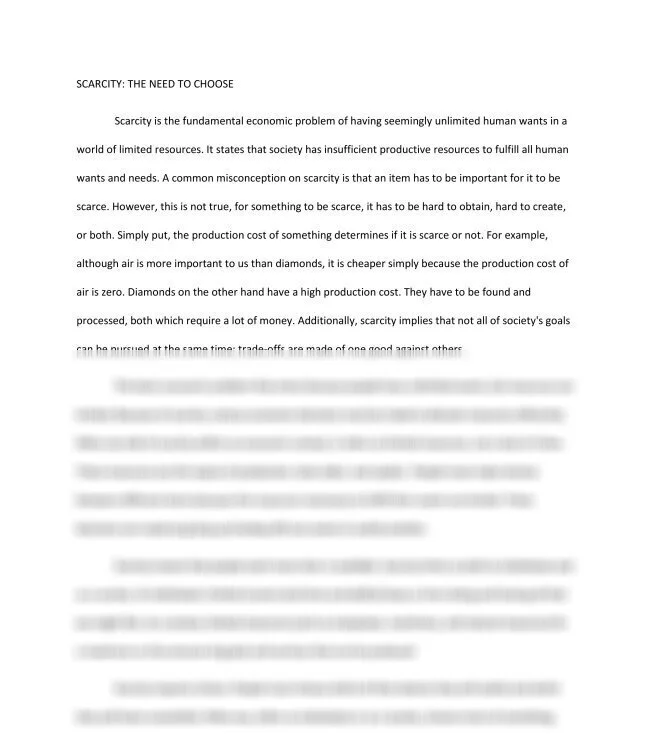SCARCITY: THE NEED TO CHOOSE Scarcity is the fundamental economic problem of having seemingly unlimited human wantsin a world of limited resources. It states that society has insufficientproductive re
SCARCITY: THE NEED TO CHOOSE Scarcity is the fundamental economic problem of having seemingly unlimited human wantsin a world of limited resources. It states that society has insufficientproductive re
(2014, (and (such (trading (which 09). 09, 2 2014, 4,998 5,000 A APA According Additionally, Alternatively, An And Another As B B). B, BASIC Because Buchanan Buchanan's But CHICAGO CHOOSE Changes Choices Citation Cite Copy DIVISION Diamonds Document ECONOMICS Economics For Harry How However, IN If In It James Lastly, Likewise, MAJOR MLA MLA7 Macroeconomics Microeconomics Most NEED People Potter QUESTION Retrieved Scarcity Simply Some Sometimes, StudyMode.com. Such THE TO The Their These They This To Usually, We What When Who You'll a ability) able about about; accommodated accommodated? activities activity against aggregate aggregates air all all. allocate also although amount an analyzed and another. answer any anyone anything anywhere, appropriately are area. arises as at attract available available) available, available. badly based basic be because before behavior being believe benefit, benefit. benefits better between book books books. bookstore bookstore's bookstores boosting both both. bought business business. but buy buy. by called came can cannot capital. case, caused central certain changes cheaper choice choice, choice. choices choices. choose chooses choosing classical clever common comparing competitors composed computer concerned conscious considerable constitute consumer consumers, context, copies cost cost-effective cost. costs costs. could create, created crops customers. day deals decide decision decisions definitions definitions, deliberate. demands desires details. determines devote diamonds, did different difficult disagrees discover discussed discussion do do, do. doesn't doing don't don't), done door. e each, early economic economics economics, economics. economist economist, economist. economists economy economy, economy. effected efficiently. either else. elsewhere emphasis emphasizing employment, enjoyment enough etc. everyone example, exist exist, expenditures, factors few find firms first five fix focus foods foods. for force forced forces found four from fruits fulfill fundamental game game. gave general get gets gives giving go goals going good good. goods got government, gross grow had hand hand. hard harvested has have having help helpful high higher highest hope household. how https://www.studymode.com/essays/Economics-56771220.html human humans. idea if ignore implies important improve improves in income income, individual individuals individuals, inputs insight insufficient interest interest. interested interrelationships into involved is is: isn't it it's it. item items its just keep kept labor, lack land, latest leave less level life. like like. likely limited limited. limits local logic look loses lot low low. machinery, made make make. make? making man manpower, manufacturer many many, market market, market. markets maximum means meet method. might mind misconception modern money money, money. more most much must national natural necessary need needs needs. next normally not not. noting notion observation obtain, of off) older on onSCARCITY: one one's only operations option options or order ordered other others. out out. outweigh own owners part pay people people, person person’s planned players playing poorly powerful presented price price, price. prices, probably problem process, processed, produce produce? produced produced, produced? producer product product, product. production production. production: productive profile profits. progress provide pursued pushed put, quality question rather read reading really received recent refers rejecting rejects relatively remember represents require requires resources resources) resources, resources. result riches. right risk sacrifice said sale sales, same satisfy say scarce scarce, scarce. scarcity scarcity, scarcity. season, seasonal second see seemingly segment self selling sells sense sent services services, services. services? serviceslFor shelves shows similar simple simply six slowly small so so, society society's society, society. sold some someone something something, sometimes specific spend statement states strawberries strawberries, strawberries. strawberry stressed study subject. such supplier supply take talk text text, than that the their theirs then theory there there, therefore these they thing thing. things things. think this those three through thus time time. time; times times. to to. too too. topics total trade-offs travel true true, try trying two typical understood units units. unlimited unsatisfied. up up. us use using various vegetables. very view want want. wanted wants wants, way way, we we, well, well. weren't what whatever when whether which who who? whole whole. whom widespread will willing wise with within without without. world worth would year, yields you you'd you'll you're your zero. —
Scarcity is the fundamental economic problem of having seemingly unlimited human wants
in a world of limited resources. It states that society has insufficient
productive resources to fulfill all human wants and needs. A common
misconception on scarcity is that an item has to be important for it to be
scarce. However, this is not true, for something to be scarce, it has to be
hard to obtain, hard to create,
